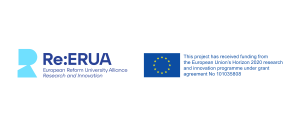
Started in November 2021, the Research component of the European Reform University Alliance, Re:ERUA aims at developing the research trajectory of the ERUA.
We will set up an Engagement Strategy for the fields of research and innovation and build our capacity for its implementation within our Alliance. We intend to eventually unite all of our domain-specific strategies within this framework, including innovative teaching and learning.
The “engagement angle” is our ambitious way to implement the ERUA’s research strategy and ensure the global coherence of its outlook. As reform universities, a key motivation to map our trajectory towards the engagement approach is its potential to sharpen our critical edge, which is a core mission for each ERUA member. Collaboration with non-academic stakeholders is a crucial source of renewal and creativity for us and a means to assess existing processes and priority areas of development, test new ideas and ensure that we are indeed contributing continuously to the advancement and prosperity of society.
To achieve the goal of establishing an Engagement Strategy for ERUA, we will:
Eventually, we will launch pilots and study cases to gather evidence about pathways to impact (internal and external) and models that might foster our institutional trajectory. The impact of these pilots and test cases will be assessed as the main criterion for evaluation and dissemination.
This project has received funding from the European Union’s Horizon 2020 research and innovation programme under grant agreement No 101035808


The purpose of this work package is to establish new ways of steering research and fostering new, inventive cooperation formats which means embracing innovation models that focus on sharing knowledge between researchers, students, start-ups and larger companies with a strong focus on sustainable and ethical concerns.
Contact: Arnaud Regnauld – aregnauld@univ-paris8.fr / Valeria Manzione – valeria.manzione02@univ-paris8.fr

The aim of this work package is to drive ERUA to foster the engagement for Responsible Research and Innovation (RRI) of all sectors’ organizations and citizens through good governance, mutual learning, agreed practices and multi-actor and public engagement initiatives in research and innovation.
Contact: Katia Dupret – katia@ruc.dk

The objectives of this work package are to develop a common framework for reskilling and up-skilling researchers/scientists and stakeholders, to provide women scientists and minorities with new opportunities, improve their skills connected with innovation and the social management of technology aimed at diversity and inclusion.
Contact: Elena Theodoropoulou – theod@aegean.gr/ erua-eui@aegean.gr

„The term Open Science bundles strategies and procedures that all aim to consistently use the opportunities of digitisation to make all components of the scientific process openly accessible and reusable via the internet. This is intended to open up new possibilities for science, society and the economy in dealing with scientific findings.“
– Mission Statement of the German-speaking Open Science AG, 2014 (translated and slightly adapted)
In this context, WP5 constitutes the central pillar of the research dissemination strategy that ERUA intends to promote within member universities and the alliance as a whole. It will make possible to take stock of the open Science policy within each university, to assess the strengths, delays and obstacles, to define a shared long-term vision and to implement a real logic of open distribution, to which all stakeholders adhere.
To discuss Open Science-related topics in a relaxed international atmosphere, the Re:ERUA Team hosts the virtual Open Science Meet-Ups on Zoom. Among other things, we explore current topics together, exchange different perspectives on Open Science and share best practices. Open Science enthusiasts from all ERUA universities are warmly invited, no registration is required.
Keen to find out more? You are very welcome to visit our website to find out what else will cover. You can also explore what we have covered so far and the session’s materials. You can also join our Open Science Meet-Up mailing list to stay up to date on future sessions.
Do you have an Open Science-related topic which you would like to discuss in the meet-ups? We would love to hear from you.
Contact: Matthias Landwehr – matthias.landwehr@uni-konstanz.de / Sonja Kralj – sonja.kralj@uni-konstanz.de


The European Commission's support for the production of this publication does not constitute an endorsement of the contents, which reflect the views only of the authors, and the Commission cannot be held responsible for any use which may be made of the information contained therein.
| Cookie | Duration | Description |
|---|---|---|
| cookielawinfo-checkbox-analytics | 11 months | This cookie is set by GDPR Cookie Consent plugin. The cookie is used to store the user consent for the cookies in the category "Analytics". |
| cookielawinfo-checkbox-functional | 11 months | The cookie is set by GDPR cookie consent to record the user consent for the cookies in the category "Functional". |
| cookielawinfo-checkbox-necessary | 11 months | This cookie is set by GDPR Cookie Consent plugin. The cookies is used to store the user consent for the cookies in the category "Necessary". |
| cookielawinfo-checkbox-others | 11 months | This cookie is set by GDPR Cookie Consent plugin. The cookie is used to store the user consent for the cookies in the category "Other. |
| cookielawinfo-checkbox-performance | 11 months | This cookie is set by GDPR Cookie Consent plugin. The cookie is used to store the user consent for the cookies in the category "Performance". |
| viewed_cookie_policy | 11 months | The cookie is set by the GDPR Cookie Consent plugin and is used to store whether or not user has consented to the use of cookies. It does not store any personal data. |